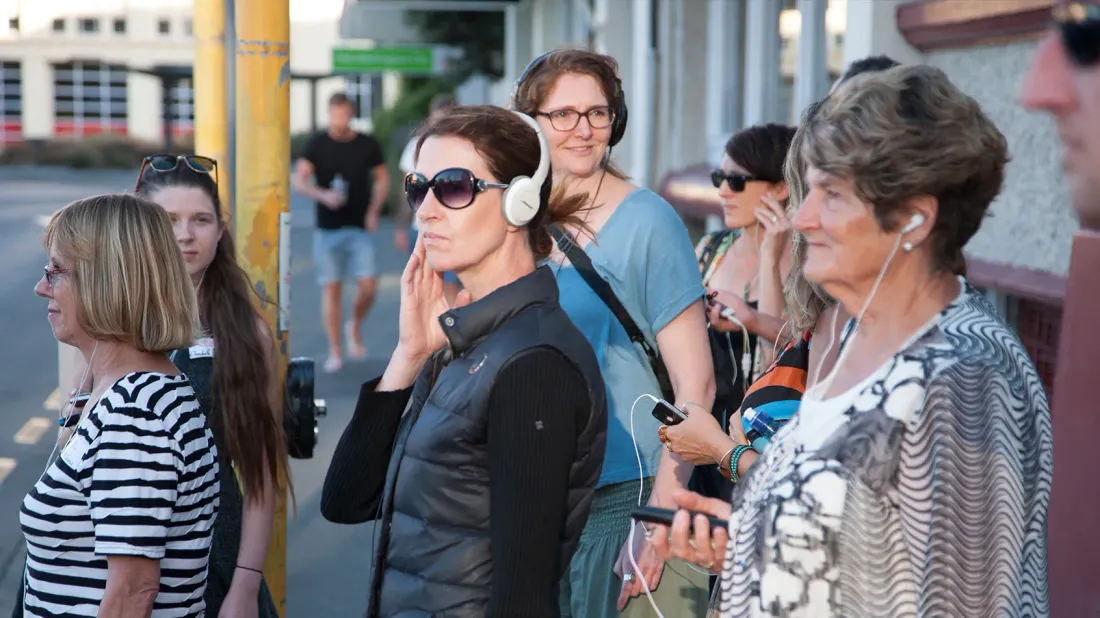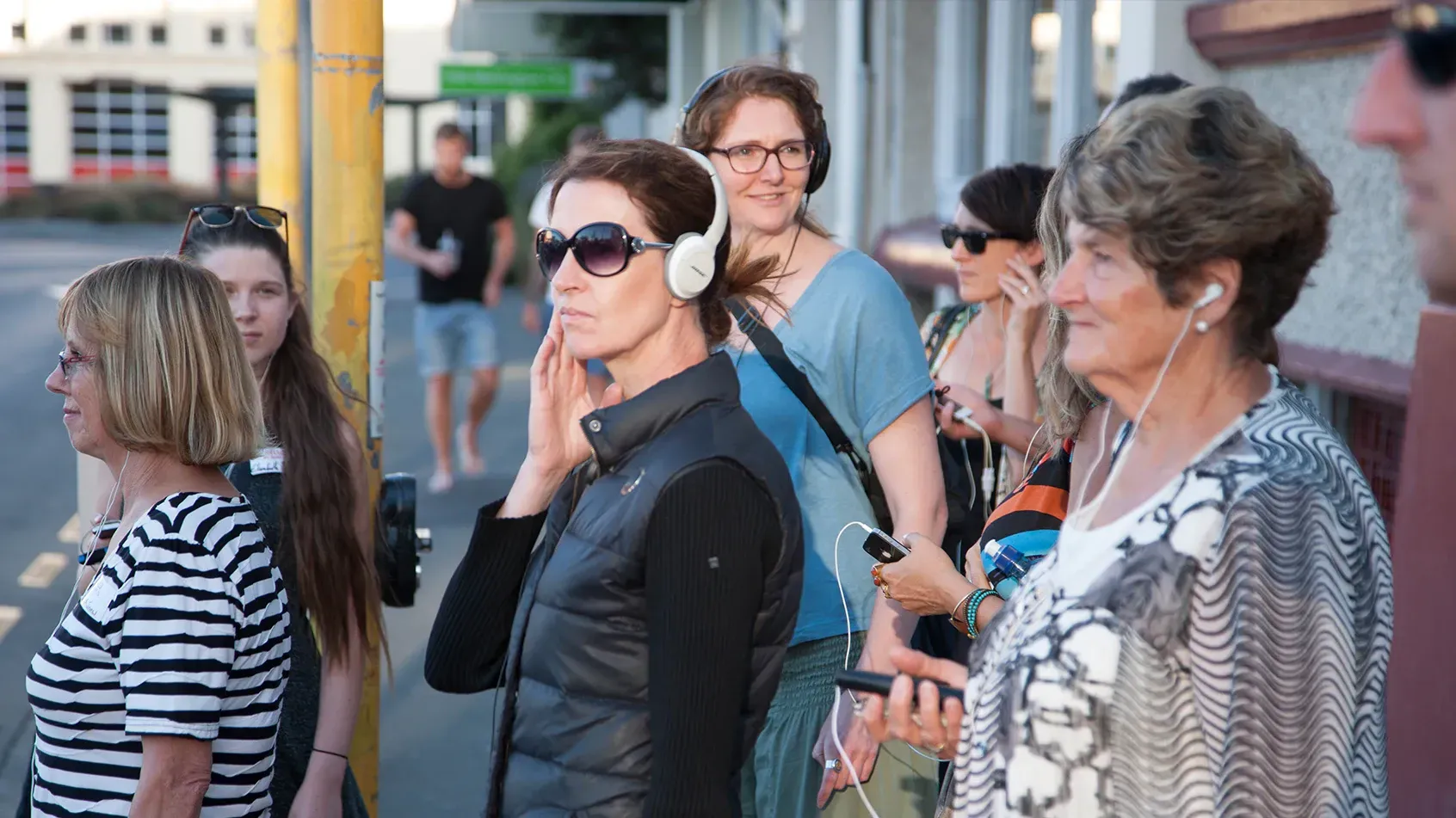Outside the Storybox
Written by


Within a month of The Woman Who Forgot digital immersive show’s first outing at the New Zealand Festival in March, the Storybox team were collaborating with the Shanghai Arts Festival to create a new story and experience.
Writer Rachel Davies couldn’t attend the NZ Festival, despite travelling between Hawaii to Wellington to repeatedly walk through and iron out The Woman Who Forgot script with director Jess Feast in the lead-up to launch. As Jess and the Wellington creative studio team worked to the wire to refine it, Rachel had to trust the story and character would resonate.
The story about a woman who has lost her memory, and her way in life, puts the audience in the shoes of the main character. Guided by apps on phones and a narrative in headphones, small groups search for her identity while busing and walking through the city, visiting live locations and interacting with actors.
“It’s interesting to be in a show and play the main character instead of just sitting in a seat watching it,” says Rachel.
Two participants suitably immersed and impressed were from the Shanghai Arts Festival. After spending years working on the first version, before they knew it Rachel and Jess were in Shanghai co-creating a new story with Shanghai Theatre Academy masters students.
Using the software developed by the Storybox team, the new work Duality looks at the exploding digital phenomenon of live streaming and premieres in October.
A seed of an idea

The Woman Who Forgot in Wellington. Photo / Matt Grace.
After knowing each other for a decade, Rachel and Jess jumped at the chance to work together. Jess had the idea for a woman who forgot, and resonated with the strong voices in Rachel’s book I Hate Plot. The narrative non-fiction was based on personal stories from Rachel’s two years living and editing a magazine at Esalen, a retreat centre and home of the human potential movement (as featured in the Mad Men finale).
“We both connected with the idea of making art you really feel. Jess wanted to make a piece of work with a strong woman’s voice, not scared to be personal and a little bit edgy.”
Neither of the filmmakers had written for theatre or a digital format before, and Rachel enjoyed writing outside of the screenplay structure. As they ‘bumbled through it together’ it cemented their collaboration and shared vision as co-creators.
“Every time we did the circuit and listened to the dialogue again we had to re-write it. It’s such a felt experience. As a writer what I thought was beautiful or clever was boring when I was on the bus.”
As it got to go-live for the festival, Jess and the technical team were under a lot of pressure to get it right, but for Rachel her duty was to the story.
“I felt like if we can write a story that people feel then we’ve got somewhere because that’s the purpose of art. But for Jess she was very brave to make it happen, it was huge."
After working on it for a year, they put everything into getting it ready for an international arts festival audience, with hopes it would go further in the future.
Re-imagining

They quickly took the chance to collaborate with Shanghai, even though it was a much shorter time to deliver it.
After a week storylining with Shanghai Theatre Academy masters students, writer Zhang Yanzhi and director Tong Tong, they had a fully fleshed out 40 page script with character descriptions and technical issues highlighted.
Rachel says it was a ‘surprisingly robust’ formula that could be replicated, and the collaboration process and team was easy to work with.
“They were very open and gracious and because of their extraordinary skill and creativity we could work really rapidly to create something that was exciting to all of us.”
Through the stories and experiences of the Shanghai team they came up with a story that resonates for their culture. While it’s a ‘thriller’ Rachel says it’s also a very tender story about the price of fame, based on a phenomenon in China of live streaming creating internet stars with millions of followers.
Live streaming is a great storytelling device, but they were also exploring the question of the integrity of art and who is a true actor or performer, especially when everyone wants to be a superstar.
The Storybox team are already in Shanghai setting it up and developing the app, and this time Rachel will be joining them to experience it - although it will be in Mandarin. Supported by Asia NZ Foundation, she’ll also be part of the RAW Land (Rising Artists Works) showcasing immersive theatre along with Sleep No More.
Known unknowns

After a career in film Rachel was burnt out and bored of the formula, which led her on a personal and professional path of writing prose and non-fiction. Collaborating with Jess to use their experience and make up a new medium as they went has created a new sense of freedom for Rachel.
“It’s really woken up a part of me that was taking a rest, it’s so exciting to work in a story that happens with an audience over time.
“I feel in love with making drama again, and that’s a real blessing. I don’t know if I want to go back to film but I certainly want to keep doing what I’m doing working at this cutting edge of technology. It just totally lights me up, it’s so much fun and so exhilarating.”
They still have plans to revisit The Woman Who Forgot, but also draw on their experiences from both productions to create a third incarnation that could tour.